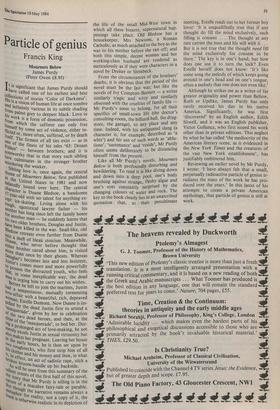Particle of genius
Francis King
Mourners Below James Purdy (Peter Owen £8.95)
1,t is significant that James Purdy should have called one of his earliest and best collections of stories 'Color of Darkness'. His is a vision of human life at once sombre and infinitely various in its subtle shading ,f1.°11.1 palest grey to deepest black. Love in Ins work is a form of demonic possession, from which the sufferer can only free himself by some act of violence, either in- flicted or, more often, suffered, or by death "elf. The firmest of all ties exist — as in
palace' of the finest of his tales '63: Dream ralace' — between brothers; and it is oteworthy that in that story such sibling love culminates in the stronger brother murdering the weaker.
„ Sibling love is, once again, the central !iletrie of Mourners Below, first published L11, the United States in 1981 and now belatedly issued over here. The central character is Duane Bledsoe, a handsome
P-Year-old with no talent for anything ex- ee
teughPt ice-skating. Living alone with his
, egotistical lawyer father — his 'pother has long since left the family home
',Or another man — he suddenly learns that 1IS two older brothers, Douglas and Justin, ipne been killed in the war. Snail-like, old ''LLsoe retreats even further from Duane into a shell of bleak stoicism. Meanwhile, .ualte, who never before thought that either brother cared about him, is visited more than once by their ghosts. Whereas Quglas's becomes less and less insistent, t0 possess comes more and more powerfully DOSSess the distracted youth, who feels itinat, in some inexplicable way, the dead a,11 is urging him to carry out his wishes. trt fore he left to join the marines, Justin 104vd a tempestuous, mutually tormenting e-affair with a beautiful, rich, depraved pellni an, Estelle Dumont. Now Duane is im- ed by the dead Justin first to attend a o'"fasquerade', given by her in celebration close two dead heroes, and then, at the in se of the 'masquerade', to bed her. Dur- a ProlongJust act of love-making, he not aisrelY excels in in sexual virtuosity but (t)hrnakes her pregnant. Leaving her house two the early hours, he is then set upon by his Ir°1181mecks who first strip him of all is, clothes and his money and then, in what broirio,.eff,eer, an act of sadistic rape, stick a As °room-handle up his backside. skies will be seen from this summary of the the t events of the first half of this novel, itatusrt°rY that Mr Purdy is telling is in the
kit m of a macabre fairy-tale or parable. •
'netaphough the narrative remains always a boot, or for is Otherwise realistic in its depiction of the life of the small Mid-West town in which all these bizarre, supernatural hap- penings take place. Old Bledsoe has a housekeeper, Mrs. Newsom, a Roman Catholic, as much attached to the boy as she was to his mother before she ran off; and both this simple, decent woman and her working-class husband are rendered as meticulously as if they were characters in a novel by Dreiser or Steinbeck.
From the circumstances of the brothers' deaths, it is obvious that the period of the novel must be the last war; but like the novels of Ivy Compton-Burnett — a writer similarly tragic and witty and similarly obsessed with the cruelties of family life Mr Purdy's seem to belong, for all their specifics of small-town life (the doctor's consulting-room, the billiard-hall, the drug- store, the garage), to any place and any time. Indeed, with his antiquated slang (a character is, for example, described as 'a whiz') and his use of such words as 'ablu- tions', 'sustenance' and 'reside', Mr Purdy often seems deliberately to be distancing himself from the present. Like all Mr Purdy's novels, Mourners Below is both profoundly disturbing and bewildering. To read it is like diving down and down into a deep pool, one's body brushing against strange, fleshy algae and one's eyes constantly surprised by the changing colours of water and rock. The key to the book clearly lies in an unascribed quotation that, at their penultimate meeting, Estelle reads out to her former boy lover: 'it is unqualifiedly true that if any thought do fill the mind exclusively, such filling is consent ... The thought at any rate carries the man and his will with it ... But it is not true that the thought need fill the mind exclusively for consent to be there.' The key is in one's hand; but how does one use it to turn the lock? Even Estelle herself does not know: 'It's like some song the melody of which keeps going around in one's head and on one's tongue, often a melody that one does not even like.'
Although he strikes me as a writer of far greater originality and power than Bellow, Roth or Updike, James Purdy has only rarely received his due in his native America. Significantly, he was first `discovered' by an English author, Edith Sitwell, and it was an English publisher, Victor Gollancz, who first issued his work other than in private editions. This neglect by what he has called 'the mediocrity of the American literary scene, as is evidenced in the New York Times and the creatures of the vast New York establishment', has justifiably embittered him.
Reviewing an earlier novel by Mr Purdy, I wrote: 'I have always felt that a small, perpetually radioactive particle of genius ir- radiates the mass of the work he has pro- duced over the years.' In this latest of his attempts to create a private American mythology, that particle of genius is still at work.














































 Previous page
Previous page